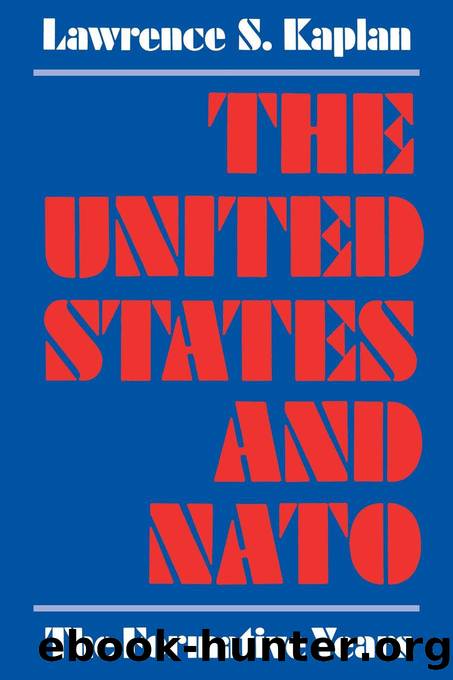The United States and NATO by Kaplan Lawrence S.;

Author:Kaplan, Lawrence S.; [Kaplan, Lawrence S.]
Language: eng
Format: epub
Publisher: University Press of Kentucky
Published: 2021-06-15T00:00:00+00:00
8. The Impact of the Korean War
For President Truman, self-conscious about his role in history, the invasion of South Korea on June 25, 1950, was a landmark that would affect the future of America and the world. He never saw it otherwise. On his flight back to Washington from his brotherâs Missouri farm that fateful day, he reflected on the meaning of the news from Korea. As he reported in his memoirs, he recalled the 1930s. If the invasion âwas allowed to go unchallenged it would mean a third world war.â1 In interviews with Merle Miller years later he repeated those sentiments. âThe flight took about three hours, and on the way I thought over the fact that what the Communists, the North Koreans, were doing was nothing new at all ... . Hitler and Mussolini and the Japanese were doing exactly the same thing in the 1930s. And the League of Nations did let them get away with it. Nobody had stood up to them. And that is what led to the Second World War.â2
The crisis convinced Truman that a worldwide Communist conspiracy had operated in Korea and would manifest itself elsewhere. This conclusion placed China under Soviet direction, and thus made subsequent isolation of the Peopleâs Republic an integral part of American foreign policy. To contain China and ultimately to return Chiang Kai-shek to power, the administration had to reorder its affairs in Southeast Asia. The cautious efforts to disengage the United States from Franceâs struggle in Indochina gave way to gradual but increasing American entanglement in the area. ANZUS, SEATO, and bilateral alliances with Korea, Formosa, and Japan all followed. The American commitment to South Vietnam thus became a heritage of the Korean War.
The heritage in Europe has proved no less clear. The vague commitment of American assistance to Western Europe in the event of attack and the lip service paid to mutual support of the many councils established by the Atlantic alliance became specific guarantees of American involvement as the Treaty was transformed into a military organization capable of defending Europe on the ground against attack from the east. If the Russians could act through the North Koreans or the Communist Chinese, they could also employ East Germans as their surrogates. To deter such a threat, a rejuvenated NATO, under American generals, divided Europe into defensible regions, lobbied successfully for inclusion in the alliance of nations on the flanks of NATO (such as Greece and Turkey), and pressed Europeans and Germans to accept the Federal Republic of Germany as a partner in the war against Communist expansionism.
Firm in its belief that no negotiation with the enemy was possible, the United States, during the years after 1950, undertook relentless combat against a conspiratorial enemy whose power seemed enormous, whose appeal was insidious, and whose control centered in Moscow. There was no room in this evaluation for possibilities of diffusion of power or division of nations within the communist world; nor was there any role for neutrals of the emerging Third World.
Download
This site does not store any files on its server. We only index and link to content provided by other sites. Please contact the content providers to delete copyright contents if any and email us, we'll remove relevant links or contents immediately.
The Secret History by Donna Tartt(17025)
The Social Justice Warrior Handbook by Lisa De Pasquale(11584)
Thirteen Reasons Why by Jay Asher(7985)
This Is How You Lose Her by Junot Diaz(5950)
Weapons of Math Destruction by Cathy O'Neil(5226)
Zero to One by Peter Thiel(5015)
The Myth of the Strong Leader by Archie Brown(4886)
Beartown by Fredrik Backman(4688)
How Democracies Die by Steven Levitsky & Daniel Ziblatt(4590)
Promise Me, Dad by Joe Biden(4579)
Stone's Rules by Roger Stone(4542)
The Fire Next Time by James Baldwin(4511)
100 Deadly Skills by Clint Emerson(4246)
Rise and Kill First by Ronen Bergman(4165)
A Higher Loyalty: Truth, Lies, and Leadership by James Comey(4158)
The David Icke Guide to the Global Conspiracy (and how to end it) by David Icke(4025)
The Farm by Tom Rob Smith(4014)
Secrecy World by Jake Bernstein(3934)
The Doomsday Machine by Daniel Ellsberg(3881)
